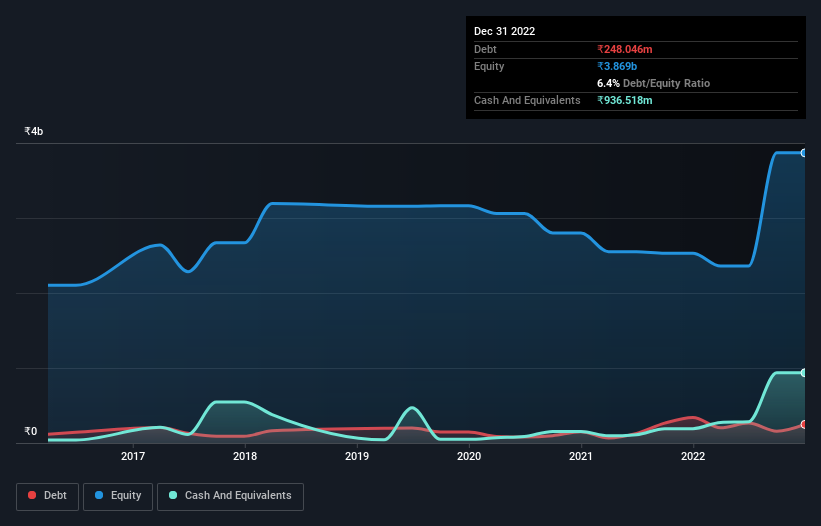Genesys International (NSE:GENESYS) Has A Pretty Healthy Balance Sheet
Some say volatility, rather than debt, is the best way to think about risk as an investor, but Warren Buffett famously said that 'Volatility is far from synonymous with risk.' It's only natural to consider a company's balance sheet when you examine how risky it is, since debt is often involved when a business collapses. We note that Genesys International Corporation Limited (NSE:GENESYS) does have debt on its balance sheet. But the more important question is: how much risk is that debt creating?
When Is Debt Dangerous?
Debt is a tool to help businesses grow, but if a business is incapable of paying off its lenders, then it exists at their mercy. In the worst case scenario, a company can go bankrupt if it cannot pay its creditors. However, a more usual (but still expensive) situation is where a company must dilute shareholders at a cheap share price simply to get debt under control. By replacing dilution, though, debt can be an extremely good tool for businesses that need capital to invest in growth at high rates of return. When we examine debt levels, we first consider both cash and debt levels, together.
Check out our latest analysis for Genesys International
What Is Genesys International's Debt?
You can click the graphic below for the historical numbers, but it shows that Genesys International had ₹248.0m of debt in September 2022, down from ₹341.2m, one year before. But it also has ₹936.5m in cash to offset that, meaning it has ₹688.5m net cash.

How Healthy Is Genesys International's Balance Sheet?
The latest balance sheet data shows that Genesys International had liabilities of ₹691.8m due within a year, and liabilities of ₹185.1m falling due after that. Offsetting these obligations, it had cash of ₹936.5m as well as receivables valued at ₹646.7m due within 12 months. So it can boast ₹706.2m more liquid assets than total liabilities.
This surplus suggests that Genesys International has a conservative balance sheet, and could probably eliminate its debt without much difficulty. Simply put, the fact that Genesys International has more cash than debt is arguably a good indication that it can manage its debt safely.
Better yet, Genesys International grew its EBIT by 198% last year, which is an impressive improvement. If maintained that growth will make the debt even more manageable in the years ahead. The balance sheet is clearly the area to focus on when you are analysing debt. But it is Genesys International's earnings that will influence how the balance sheet holds up in the future. So if you're keen to discover more about its earnings, it might be worth checking out this graph of its long term earnings trend.
Finally, a business needs free cash flow to pay off debt; accounting profits just don't cut it. Genesys International may have net cash on the balance sheet, but it is still interesting to look at how well the business converts its earnings before interest and tax (EBIT) to free cash flow, because that will influence both its need for, and its capacity to manage debt. Over the last two years, Genesys International saw substantial negative free cash flow, in total. While investors are no doubt expecting a reversal of that situation in due course, it clearly does mean its use of debt is more risky.
Summing Up
While we empathize with investors who find debt concerning, you should keep in mind that Genesys International has net cash of ₹688.5m, as well as more liquid assets than liabilities. And it impressed us with its EBIT growth of 198% over the last year. So we are not troubled with Genesys International's debt use. The balance sheet is clearly the area to focus on when you are analysing debt. However, not all investment risk resides within the balance sheet - far from it. For example Genesys International has 4 warning signs (and 1 which can't be ignored) we think you should know about.
At the end of the day, it's often better to focus on companies that are free from net debt. You can access our special list of such companies (all with a track record of profit growth). It's free.
New: Manage All Your Stock Portfolios in One Place
We've created the ultimate portfolio companion for stock investors, and it's free.
• Connect an unlimited number of Portfolios and see your total in one currency
• Be alerted to new Warning Signs or Risks via email or mobile
• Track the Fair Value of your stocks
Have feedback on this article? Concerned about the content? Get in touch with us directly. Alternatively, email editorial-team (at) simplywallst.com.
This article by Simply Wall St is general in nature. We provide commentary based on historical data and analyst forecasts only using an unbiased methodology and our articles are not intended to be financial advice. It does not constitute a recommendation to buy or sell any stock, and does not take account of your objectives, or your financial situation. We aim to bring you long-term focused analysis driven by fundamental data. Note that our analysis may not factor in the latest price-sensitive company announcements or qualitative material. Simply Wall St has no position in any stocks mentioned.
About NSEI:GENESYS
Genesys International
Provides geographical information services in India and internationally.
Solid track record with adequate balance sheet.
Similar Companies
Market Insights
Community Narratives




